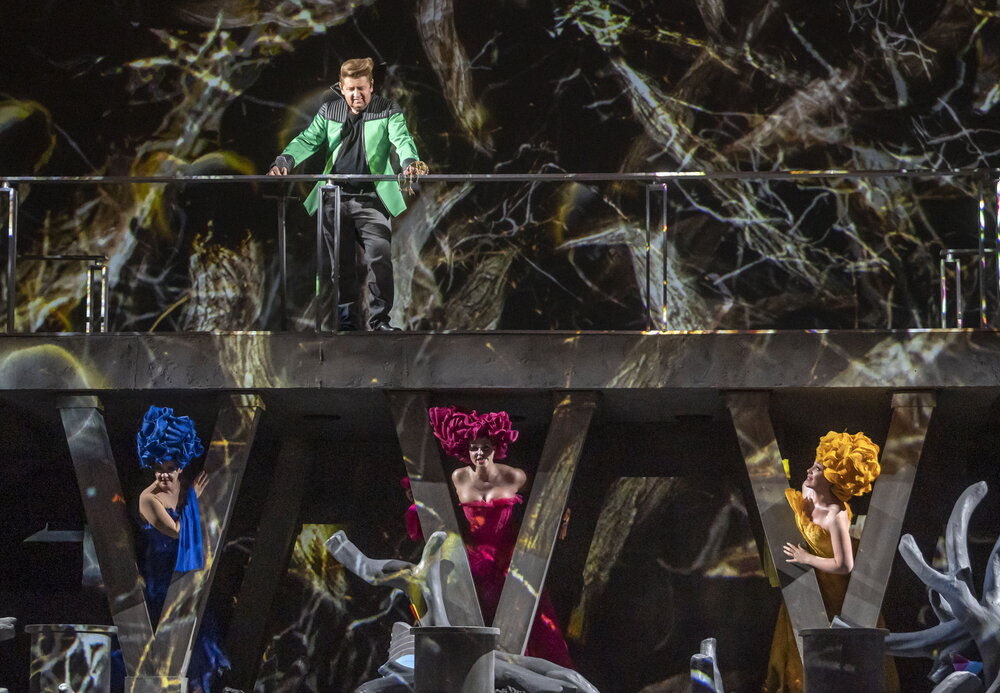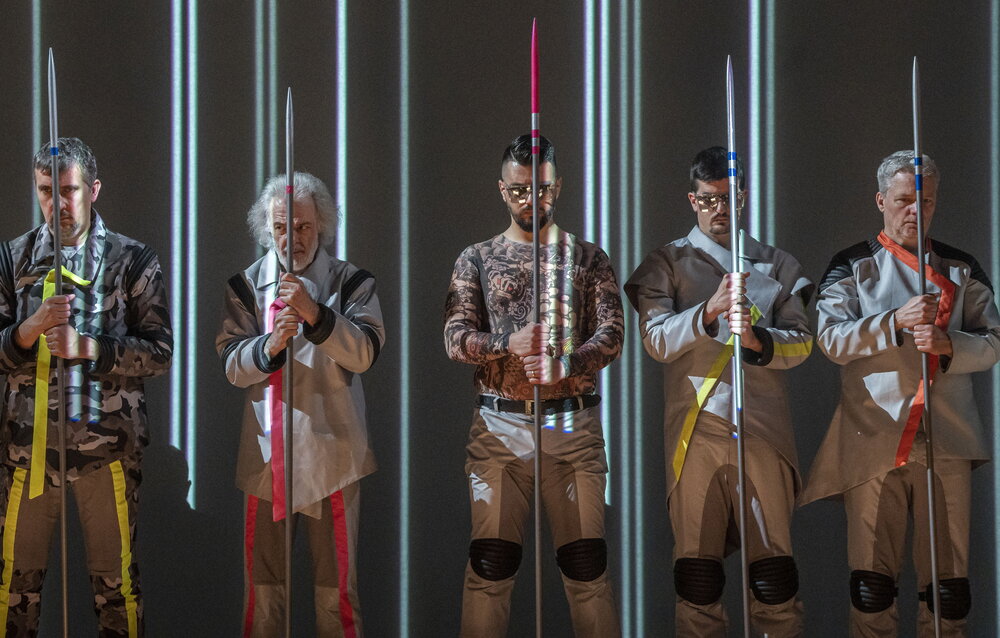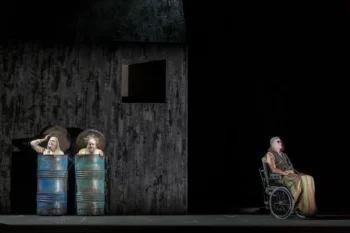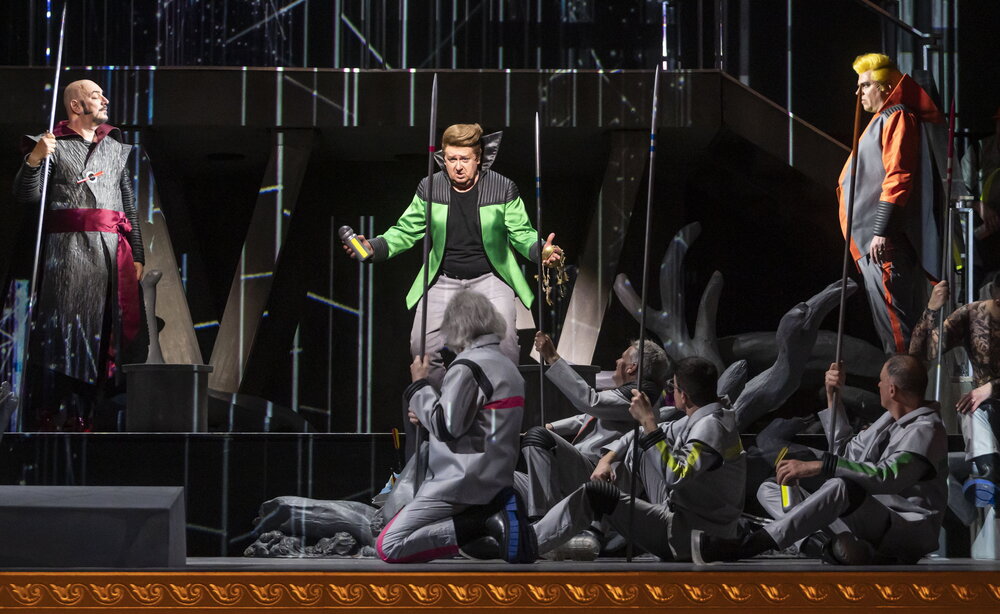Directed by Géza M. Tóth, starring István Kovácsházi, Szilvia Rálik, Károly Szemerédy, Lilla Horti and Géza Gábor, and conducted by general music director Balázs Kocsár, the Hungarian State Opera presents the final episode of Wagner’s monumental Ring cycle on 15 May 2022.
Wagner spent over a quarter of a century perfecting his grandiose cycle of four operas, the deeply philosophical Der Ring des Nibelungen based on German and Norse mythology. Politically active during the 1848 revolutions, the composer developed his concept about Siegfried in reaction to those events − the image of a future hero who will destroy the society of gold and violence, predicting a new era governed by love.

István Kovácsházi (Siegfried), Zita Váradi (Woglinde), Natália Tuznik Natália (Wellgunde) and Viktória Mester (Flosshilde). Photo: MTI/Zsolt Szigetváry
The failure of the revolutions added a darker tone to the planned work, which was going to be titled Siegfrieds Tod (Siegfried’s Death).
It was also while he was working on the libretto that Wagner recognized the necessity of telling the story of the young Siegfried and showing the fall of Wotan, the god responsible for the sins of the old world, in order to realize his concept.

MTI/Zsolt Szigetváry
So the starting point of the tetralogy is contained in Götterdämmerung, the episode is about to be premiered. The almighty ring forged from the gold stolen from the Rhinemaidens and then lost by Alberich has become a token of love between the hero Siegfried and the Valkyrie Brünnhilde, who sacrificed her divinity for love. It is now Alberich’s son, Hagen who does everything in his power to try to get back the cursed piece of jewelry, even taking advantage of his well-meaning half siblings, Gunther and Gutrune. The piece rich in musical and philosophical motives was first performed as part of the Ring tetralogy in 1876, in the Festspielhaus built for this purpose in Bayreuth.
Its Hungarian premiere was held in the Royal Hungarian Opera in 1892,
where it was also directed by Kálmán Alszeghy and László Márkus among others until 1945. Later, as a part of the renewal of the tetralogy, it was staged by András Békés in 1969 and by Viktor Nagy in 1998; it was included in the repertoire of the opera in 2007 last time, and it was played a total of 162 times.
Just as the 2015 production of Das Rheingold, Die Walküre in 2016 and Siegfried in 2017, the 15 May premiere is also directed by Géza M. Tóth. The staging, critical of consumer society, accompanied by projected animation, features the set design of Gergely Zöldy Z again, the extravagant costumes of Ibolya Bárdosi, the projected visuals of KEDD Animation Studio, and the choreography of Marianna Venekei. Main roles of the opera are sung by István Kovácsházi (Siegfried), Szilvia Rálik (Brünnhilde), Károly Szemerédy (Gunther), Lilla Horti (Gutrune), Géza Gábor (Hagen), Zoltán Kelemen (Alberich), Andrea Szántó (Waltraute), Bernadett Wiedemann, Andrea Ulbrich, Zsuzsanna Ádám (Norns), Zita Váradi (Woglinde), Natália Tuznik (Wellgunde) and Viktória Mester (Flosshilde); the Hungarian State Opera Orchestra and Chorus (chorus director: Gábor Csiki) are conducted by general music director Balázs Kocsár.
After its premiere on 15 May 2022, this season Götterdämmerung will be performed at the OPERA on 19, 22, 25 and 29 May, as well as 1 June, and then it will return to the repertoire of the Ybl Palace on Andrássy Avenue as part of the entire Ring cycle in November.

Read also Le Monde: Hungarian composer’s opera performed in Paris was a masterpiece!
Source: Press Release/Hungarian State Opera
please make a donation here
Hot news
Budapest tourism “exploded” this past weekend
Container transport in Budapest may stop: How will this affect Hungarian economy?
Minister: Hungary will protect its territory by every means possible
Orbán cabinet may double airspace fee: another ticket price increase?
Hungary expanding the list of prohibited designer drugs
Hungarian minister: Ukraine ‘blackmailing’ Hungary and pro-peace states





1 Comment
very informative blog!!!!!